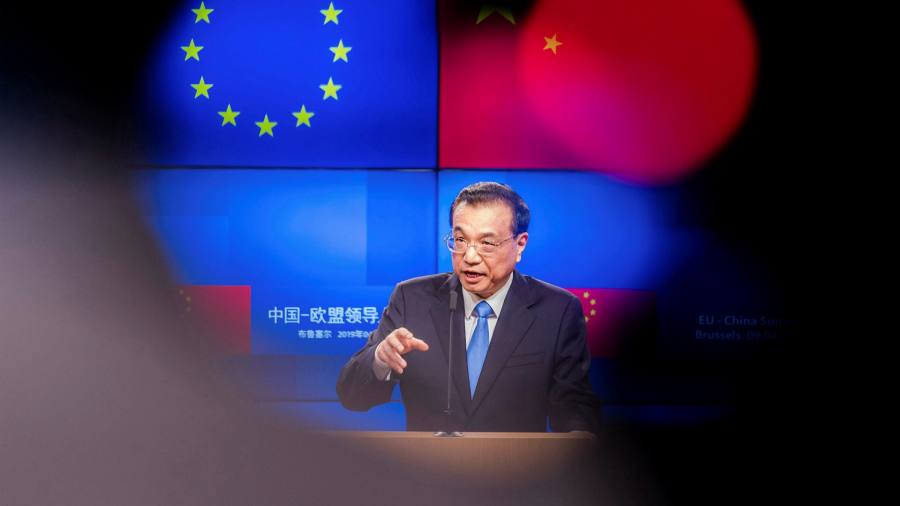[ad_1]
Back in December, European Commission president Ursula von der Leyen claimed that a deal Brussels had struck with Beijing on an investment treaty would give the EU “a lever to eradicate forced labour†in China.Â
Instead, the market-access deal is now on the frontline of an escalating diplomatic row over China’s persecution and mass internment of Uyghur Muslims in the Xinjiang region.Â
Valdis Dombrovskis, EU trade commissioner, told the Financial Times that ratification of the EU-China Comprehensive Agreement on Investment had become bound up with Beijing’s decision this week to target specific European politicians, think-tanks and academics with travel bans and other restrictions.Â
“The ratification process cannot be separated from the evolving dynamics of the wider EU-China relationship,†he said. “The prospects for the CAI’s ratification will depend on how the situation evolves.â€
While it is self-evident that ratification — a process requiring approval from the European parliament — is unrealistic at a time when MEPs are being denounced by China and banned from its territory, nothing about the situation is simple for the EU.Â
Part of the problem is that the CAI is a longstanding EU priority. For all von der Leyen’s claims about its human rights provisions, the bulk of the agreement is concerned with responding to European grievances about the treatment of EU companies in the Chinese market.Â
Brussels has even made securing the CAI — the fruit of seven years of difficult negotiations — a public test of China’s good faith on trade, leading to tense exchanges at bilateral summits when the EU side felt progress had been too slow.Â
Trade experts have questioned the depth of the benefits offered by the deal, but not that the new market opening runs mainly in the EU’s favour. Among the CAI’s advantages are that it offers possibilities for European companies to increase production in promising fields such as electric cars while eliminating requirements in some sectors to partner with local firms.Â
For China, the gains are more political: shoring up its relationship with the EU at a time when the US is looking to direct international pressure against Beijing.
To put the CAI on the backburner would mean benching a treaty that leaders such as Angela Merkel and Emmanuel Macron see as one of the EU’s biggest recent achievements. But fortunately, the EU doesn’t need to — at least not right now.
The need to legally check the deal and translate it into 24 official EU languages means the CAI will not even reach the European parliament’s table until late this year, at the earliest.
MEPs involved in the process said their hope was that it would buy time for de-escalation while sanctions against MEP and other entities were unwound. Iuliu Winkler, the European parliament’s lead MEP on China, noted on Tuesday that “CAI is not on the table now; there is still a long road aheadâ€.Â
“Along that path, China has to respond to the expectations of the European parliament.â€
If Beijing doesn’t, the CAI could be headed for a long time in limbo.
Chart du jour: manufacturing success

Germany’s factories are doing a roaring trade, with the purchasing managers’ indices for German manufacturing a full 10 points ahead of the European average. But there is one black spot for workers: they have yet to see a pay rise. Germany’s largest manufacturing union, IG Metall, may only secure a 2 per cent raise for its members this year. (chart via FT Alphaville)
News around Europe
-
Brussels will on Wednesday announce a tightening of its contentious vaccine export restrictions, giving the EU powers to block shipments to countries that do not reciprocate by sending jabs to Europe. The measures will apply to jabs from all companies, not just from manufacturers not honouring their EU contracts. The FT has seen the draft text ahead of Thursday’s leaders’ summit, where the issue of export curbs is likely to divide governments again, amid sabre-rattling towards the UK and AstraZeneca. Germany, meanwhile, has become the latest country to extend its lockdown measures for another three weeks to contain rising infections. Belgium’s national security committee also meets on Wednesday to decide whether to shut down schools and all non-essential businesses. (Die Welt)
-
The soon-to-be anointed head of the OECD Mathias Cormann has warned the EU against using its planned carbon border adjustment mechanism, which would see tariffs slapped on imports into the bloc from countries that are not committed to net-zero emissions. Cormann told the FT that non-EU countries should be allowed to pursue different approaches to reducing net emissions. His warning came on the back of caution from John Kerry, US special envoy for climate change, about the carbon border levy. A group of nine countries, including France, Spain and the Netherlands, have backed the tool, defending it against accusations of “green protectionismâ€.
-
US president Joe Biden will dial in to Thursday’s videoconference of EU leaders. Biden’s guest appearance over dinner will follow US secretary of state Antony Blinken’s meetings with EU officials on Wednesday to talk China. Blinken has also made positive signals about Nato, telling foreign ministers on Tuesday that the US wanted to “revitalise the allianceâ€. (FT/Euronews)
-
Richard Szostak has been tapped to head the EU unit that will oversee the implementation of the Brexit withdrawal agreement. The veteran EU technocrat, born and raised in London, will have the unenviable job of navigating fractious UK-EU relations alongside commission vice-president Maros Sefcovic. (Politico)
Coming up today
The European Commission will unveil a tightening of its export transparency mechanism around noon (CET).
[ad_2]
Source link







